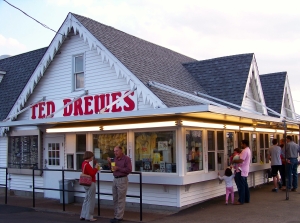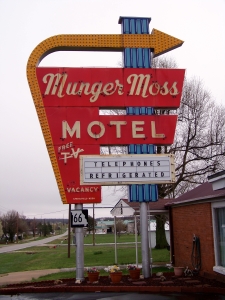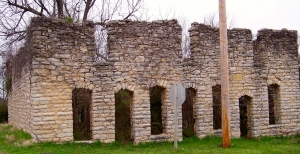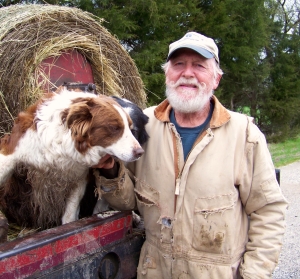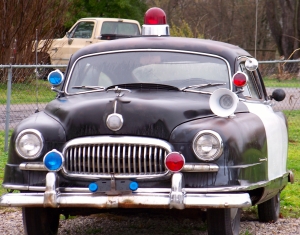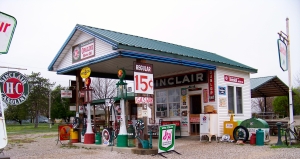The last time I posted, I was heading into Missouri and the Ozarks. Although there are places that are more “Southern”, the Ozarks have one foot firmly planted there. You first notice it in the twang. And the hills and woods. Mostly, you notice it in the friendliness of the people.
This is where my trip has finally begun to take on the pace of 66. You stop for a cup of coffee and leave an hour later, after having heard the life story of the retired teacher who served it to you. And, their kids stories. And their grandkids stories.
Although I’m not there, yet, I feel as though I’m getting much closer to home. The twists and turns in the road remind me of late nights with Dad, moving on to the next town so we can get an early start with his customers in the morning. When he was on the road, everything was focused to serve the needs of his business.
He would always tell me what separated him from the rest. “These other guys, they just want to sit around and tell stories, go out drinking with their buddies. They get out here on the road, with no one there to watch them work, and they don’t. Pretty soon, their numbers fall off, and then they’re gone.”
Years ago, out of curiosity, I watched the Maysles’ film, Salesman. I think, if you’re a fireman, you’re probably going to want to see how your business projects onto the screen. So it was with me.
The film was a reflection of the type of sales I had done, when I wasn’t working and living with my dad. I’m not religious, and I used that aspect of the film to distance myself from its subject. But it was recognizable. When the boss role plays with you, quickly throwing out lines to his guys for every objection they offer, you know it’s not real. You can marvel at their verbal dexterity, but you know that, to pull if off successfully, it involves an ethic that ignores the prospect as a person and sees them simply as someone who needs to be cajoled into doing what you want them to do so you can win. So you can have the nice house, the nice car, the nice bank account.
Yes, it was familiar to me. It was not what my dad did. As much as he tried over the years to teach me the truly great salesman are not the glib ones, but the ones who build long-term partnerships with their customers, I didn’t get the message. I hated sales.
What I did get was the wanderlust. I’ve never outgrown that.
*****
Missouri is diverse. It is a swing state politically, because of that diversity. It comes in four parts, as I remember it. The northern part belongs solidly in the Midwest. Kansas City, a town I lived in for a few years, is part Midwest, part western cattle town. The Ozarks are rooted in the South. Finally there’s St. Louis and its’ two big rivers – the Mississippi and Missouri.
Crossing the Mississippi, the transition is abrupt. Gone are the flat prairies of Illinois. Seemingly out of nowhere, a city emerges with an architectural skeleton rooted in its French past. Red brick abounds. Driving through, I see neighborhood after neighborhood that appear to be well-planned, with boulevards serving as connective tissue. All of it old. Someone once had a great idea. I hope someone does again, because this city should be a shining example. All of the elements are there except opportunity.
If you watch Meet Me in St. Louis, you get an impression of a city that never really existed physically. The city depicted in that film did exist spiritually. That’s what provided the impetus for its growth after decades of its position as the core of French America, and later the gateway to the West. But, the houses would have been red brick. And, that trolley that was clang clang clanging? Well, it was designed to take folks to the suburbs, and that’s where they went, causing one of the worst examples of suburbanization in the country.
Leaving the city, I stop at a Route 66 icon – Ted Drewes Frozen Custard. You know those Blizzard things Dairy Queen sells so many of? Well, they were invented here as a concoction called the Concrete, and there is no comparison. The Blizzard is like a bunch of candy or cookies crushed up in a routine frozen kind of vanilla-maybe-food. The Concrete is a sublime taste experience that artfully blends flavors in a delightful dessert that tastes like…frozen CUSTARD! I try their Sour Cherry Concrete, take a few pics, buy one of their bright yellow t-shirts proudly declaring they’ve been serving Route 66 since 1929, and push on.
I call ahead to Ramona at the wonderful old motor lodge, the Munger Moss, to tell her I’m running late.
“You just go on and take your time. I won’t hold you to your reservation.”
I mumble something about needing to keep to a schedule if I’m to get to Hollywood in time for the Festival.
She replies, “There’s a lot of pretty country between us you don’t want to miss! Devil’s Elbow is just beautiful.”
I thank her for her patience, and push on to to Lebanon, determined to meet Ramona, and keep her from having to stay up too late.
The Munger Moss started in the late 30’s as a barbecue joint near Ft. Leonard Wood. When Mr. Munger passed away, Mrs. Munger married Emmett Moss. Their barbecue became a Route 66 legend. During the war years, the place was bypassed when the Army cut down the nearby hill to give their trucks easier access.
The Hudson’s bought the place and moved it to its present location near other Route 66 places like the Green Gables and the Rock Court, which were already booming with Route 66 traffic. Starting with a design that had 14 cabins separated by garages, business gradually drove expansion.
Problem was, this was the war years and rationing was in effect. Using lumber that was acquired in the black market, construction went on. Mr. Hudson “stayed hid”, because “if the Feds couldn’t find the owner, they couldn’t stop the construction.”
Jessie Hudson told Ramona that once, she went to St. Louis to one of the big department stores and was escorted out because she asked to purchase a case of toilet paper. “Things like sugar were hard to come by. All meat was ordered through a salesman, and then brought in by the train. Depot would call…. come get your meat.”
“It was in 1957 that the four-lane was opened that by passed the city. Again fears that business would die loomed in the background. But the day came that the highway was opened. The highway department had not connected the road by the motel to the business loop yet. Mr. Hudson went down to the corner with plank to put across the ditch…. painted a sign that said Munger Moss with an arrow pointing down toward the motel. It was on a Saturday night, and he said they came around just like clockwork.. Munger Moss was not going to be by passed.. it would survive.”
Ramona and Bob bought the place in 1971, and have worked closely, as I would learn so many have over the years, to restore it and keep serving the Routers that travel from all over the world to spend time on America’s Main Street.
The next day, I’m driving towards that night’s stop – Tulsa. I pull over to the ruin that is all that remains of Plano, Missouri.
Calling ahead to my lodging in Tulsa, I tell them I might be a little late. She wants to know when. I say I have no idea, but I’ve clearly booked too much into each day.
Looking in my rearview mirror, I see this guy pull his pickup truck up behind me. He knocks on my window. With my best city-guy brusqueness, I roll down the window and blurt out, “How can I help you?”
“Well, I was thinkin’ I could help you!”
I get it now, the pace is slowing. The people are just lendin’ a hand, fella.
He introduces himself as the Mayor of Plano. He tells me all about his town. Then, he asks me to put a dollar in that second mailbox right there if I take a picture. Says they need it to keep the lights of Plano on. I ask him if I can take a picture of him, and he agrees. I get the feeling he’s done this before.
“I had a feller leave one dollar and a torn dollar in there once. He left a note sayin’ he took took two pictures. The first one turned out fine. The second one weren’t so good.”
A little further down the road, I pull over at Whitehall Mercantile. The old-timer there is telling me he’s a retired school teacher. When he went to graduate school, they asked him what he wanted to study. “I don’t know. Y’all are the teachers.” So, they taught him to teach.
He walks me around his store selling me all kinds of junk I wouldn’t normally buy. I wouldn’t budge on the 15-pound Route 66 sign, though. He tells me the Chinese couple that was through last week, they wouldn’t budge on it either. “Too heavy!”
He wastes no time telling me that the Mayor of Plano, he’s just full of it. “Why, I used to live in that old building when I was just a kid, and that guy, he moved into the little gas station across the street.”
I tear myself away, a few dollars poorer, with a heavier car. A very few miles later, I pull over at the Gay Parita Sinclair Station. The owner, Gary Turner, is sitting down drawing in a book, Images of 66, by David Wickline. It’s full of outstanding photography of everything, and I mean EVERYTHING, along Route 66.
Without even asking me if I want a copy, Gary says, “Now let me tell you how to use this book. You’re gonna be travelin’ along 66, and you’re gonna meet a lot of people.”
“You mean like the Mayor of Plano?”
“That guy, I kinda disagree with him on some things. So, anyway, as you travel along, just the people that are really special, those are the only ones you want to sign your book. That way, when you look back at this book, you’ll see a signature in it, and you’ll always remember them. Because they were the special ones. You’ll never forget them.”
I tell Gary I’ve only got $35 on me until I can get to an ATM, but I can give him a credit card. “No, you’ll need that cash on up the road. When you get home, you just send me a check. Send it to Lena Turner. She’s the boss.”
He takes me outside and puts a CD on his little player. “I wrote that song. Sent it off to this guy to record it. He did, and then he claimed he wrote it. I don’t know why people in that business are like that. But, he made a mistake and sent me the masters. I wrote them songs because everybody that comes in here tells me that this is the trip they’ve dreamed of all their lives.”
Getting back in my car, I call my lodging in Tulsa and tell her I’ve got no chance getting there early. I’ve just spent two hours going three miles.
